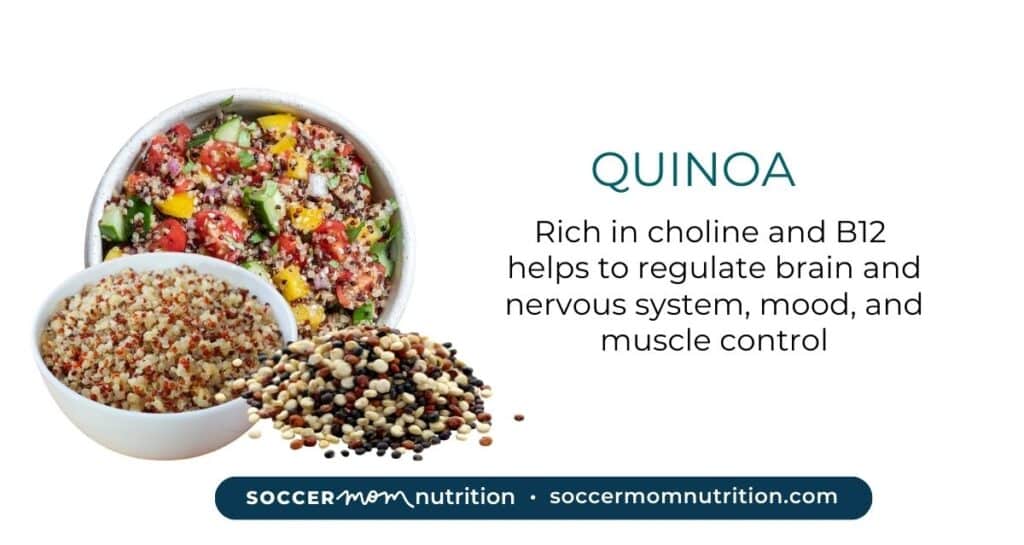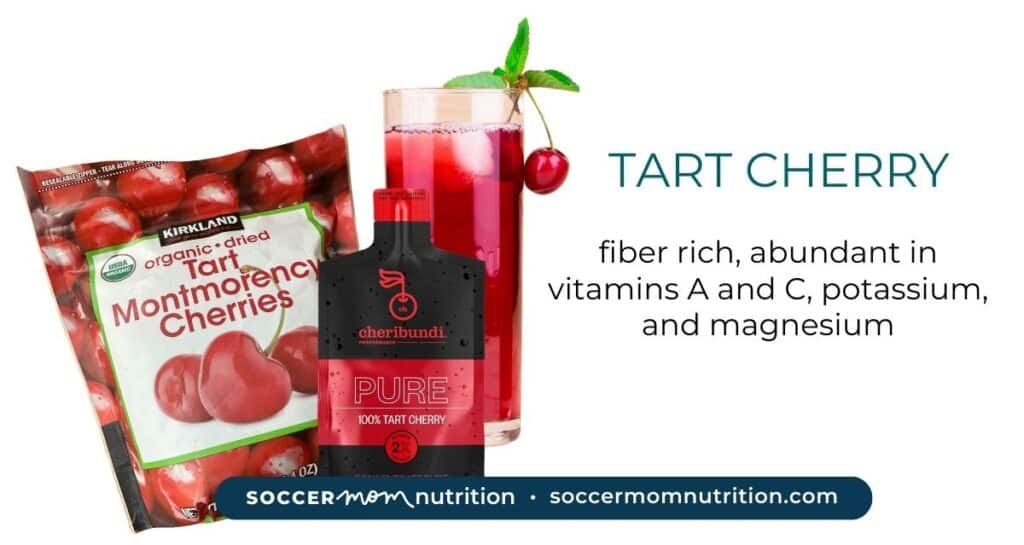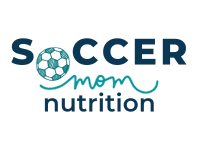21 Best Foods for Soccer Players-Top Choices for Fueling and Recovery
When it comes to peak performance on the pitch, the best foods for soccer players can make all the difference.
Whether you call it soccer or football, the right soccer nutrition is your secret weapon for energy, stamina, and recovery. So, what’s on the menu for footballers?
Let’s dive in and discover the best foods for soccer player that fuel soccer performance.

Please note that this article contains affiliate links. If you click one of these links and make a purchase, we may earn a commission. As an Amazon Associate, we earn from qualifying purchases.
21 best foods for soccer players
Here are my top rated best foods for soccer players. Not only are they dietitian-recommended, they are athlete approved. And they’re the building blocks for a performance plate whether it’s game day or recovery.
Use these recommendations to create your favorite meals and healthy snacks, both for pre-game, halftime, post game and recovery days.
1. Oatmeal
Oatmeal is a great source of complex carbohydrates, providing sustained energy in addition to supporting refueling your glycogen stores.
The soluble and insoluble fiber in oatmeal also keeps you full and helps your blood sugar stay stable. Oatmeal is rich in calcium, iron, zinc, potassium, magnesium and other minerals.
Try a bowl of oatmeal for breakfast, loaded with fresh blueberries, walnuts and hemp seeds, topped with milk for extra protein. You can also use an instant oatmeal packet to make a fast breakfast.
Or if you’re going to be tight on time in the morning, you can make some overnight oats that will be ready to grab and go.
2. Quinoa
Quinoa is a nutritional star for footballers. It’s a plant-based grain that’s a complete protein, containing all nine essential amino acids, making it a great choice for vegan and vegetarian athletes.
Because it’s high in fiber, it aids in digestion and satiety, and it’s packed with vitamins and minerals such as iron, magnesium, and phosphorus
Quinoa’s nutty flavor and fluffy texture make it a tasty and versatile addition to meals, pairing well with a variety of ingredients, both sweet and savory.
Whether served as a side dish, added to salads, or used as a base for power bowls, quinoa is an excellent choice to support footballers’ athletic performance and recovery.

3. Whole wheat bread
Whole wheat and high fiber bread products, including bagels, are excellent choices for athletes due to their nutrient-density. They provide a good source of complex carbohydrates and fiber, vitamins and minerals.
Bagels, especially those made from whole grains, can be a convenient and portable source of energy for athletes, providing the necessary fuel for muscle function and recovery.
Incorporating whole wheat bread and bagels into a soccer player’s diet can support overall health while contributing to optimal performance.
They can be enjoyed in various forms, from sandwiches to toast, and are versatile enough to be included in any meal of the day.
4. Blueberries
Blueberries, are the ultimate antioxidant powerhouse fruit for soccer players. They’re rich in fiber (4 grams), vitamins C and K, and minerals that support overall health and athletic performance.
These small fruits are a perfect snack or addition to a meal. Blend them into a smoothie, toss them into oatmeal or low fat greek yogurt, or simply enjoy a handful for a quick and nutritious snack.
Enjoy these nutrient-dense berries as part of your daily diet to help reduce inflammation, aid muscle recovery, and provide essential carbohydrates for sustained energy on the field.
5. Tart cherries
Tart cherry juice has a high concentration of antioxidants and anti-inflammatory properties. It’s particularly rich in anthocyanins, which can help reduce muscle pain and inflammation post-exercise, improving recovery.
Tart cherries are nutrient and fiber rich, abundant in vitamins A and C, potassium, and magnesium.
Footballers may find tart cherry juice beneficial for improving sleep quality, thanks to its natural melatonin content, which aids in regulating sleep cycles.
Incorporate tart cherry juice into your recovery plan, using it as a high carb recovery drink, adding it to a post workout smoothie, or drinking a concentrate packet before bed.

6. Bananas
A medium banana is rich in carbohydrates and contains about 3 grams of fiber to aid digestion and promote satiety. It’s also an excellent source of potassium and magnesium, as well as vitamin C, vitamin B6, and various antioxidants that support overall health.
Since bananas come in their own wrappers, they’re a portable and convenient. snack, and especially easy on the stomach. They provide just the right amount of carbs for a pre-game snack about 30-60 minutes before your match or training.
Whether eaten on their own, sliced into oatmeal, added to peanut butter toast, or blended into a smoothie, bananas are a versatile and beneficial addition to any athlete’s diet.
7. Beets
Beets are a superfood for soccer players. Not only are they chock full of fiber, vitamins and minerals, such as calcium, iron, copper, potassium and manganese, they offer antioxidant and anti-inflammatory benefits.
Additionally they’re high in nitrates, which get changed into nitric acid in your body. Beet root juice and powder has been shown to improve blood flow, oxygen delivery and endurance.
You can drink beet root powder before activity or blend it into a smoothie. My favorite way to eat beets is to add chopped beets on a salad.
8. Sweet potatoes
Sweet potatoes are high in carbs and rich in beta-carotene, supporting healthy vision, skin, and immune function. The high vitamin C content contributes to immune defense and tissue repair, while potassium helps regulate fluid balance and muscle contractions.
Sweet potatoes are also source of manganese and copper, important for bone health and energy production.
With their natural sweetness and versatility, they can be baked, mashed, or turned into fries (air-fryer), making them a delicious and nutritious choice for athletes looking to fuel their performance and recovery.
9. Green leafy vegetables
Leafy greens deserve a spotlight on your performance plate.
In addition to being rich in fiber and vitamins like A, C, and K, they are also packed with anti-inflammatory benefits, and a variety of minerals that are crucial for maintaining optimal health and enhancing athletic performance.
Incorporating a mix of leafy greens into your diet can be incredibly beneficial. You can enjoy them raw in salads, blended into nutrient-packed smoothies, or cooked in a variety of dishes.
Their versatility makes it easy to gain the benefits of their nutrients, which support muscle strength, boost energy levels, and aid in recovery after intense workouts or games.
10. Eggs
Eggs are an excellent source of protein, which is essential for muscle growth and repair. These tiny foods are a powerhouse of nutrients, including folate and selenium.
They also contain healthy fats to support hormone production. Rich in choline and B12 which helps to regulate your brain and nervous system, mood, and muscle control.
You can enjoy eggs in a variety of ways. From scrambled with a side of roasted potatoes and fresh fruit to fried atop an english muffin or hardboiled and eaten on the go, eggs are a versatile and satisfying snack.

11. Salmon
Salmon is a superfood for athletes, thanks to its rich content of omega-3 fatty acids, which are known for their anti-inflammatory properties and benefits to brain function, mood, and heart health.
These essential fats can help reduce joint stiffness and muscle soreness after intense physical activity. Additionally, salmon is an excellent source of high-quality protein, making it an ideal best food for soccer players for recovery.
You can enjoy salmon in various ways: grilled, baked, or even raw in sushi, making it a versatile addition to any soccer player meal plan.
12. Chicken or turkey breast
Lean chicken or turkey, especially the breast portion, is a staple in an athlete’s diet due to its high protein content, which is essential for muscle growth and repair.
It’s also a great source of B vitamins like niacin and B6, which support energy production and efficient metabolism.
Chicken is low in fat and calories, making it an ideal choice for athletes who are focused on building lean muscle mass while maintaining a healthy weight.
13. Tofu
Tofu is a plant-based protein powerhouse that provides all the essential amino acids needed by the body.
It’s also rich in iron, calcium, and other minerals, making it an excellent choice for athletes, especially those following a vegetarian or vegan diet.
Tofu’s phytonutrients, such as antioxidants and polyphenols, can help reduce inflammation caused by intense exercise, supporting muscle recovery and overall health.
14. Beans and legumes
Beans and legumes are a natural combination of protein and carbohydrates, rich in fiber making them ideal for muscle repair, gut health and energy replenishment.
They are also rich in vitamins and minerals such as folate, manganese, potassium, iron, copper, and magnesium.
Enjoy beans in a hearty chili, as a filling for burritos, blended into hummus, or simply added to salads and soups. You can also find many roasted options too for a savory and crunchy snack.

15. Nuts and seeds
Nuts and seeds are loaded with antioxidants, vitamins, and minerals such as magnesium, vitamin E, copper and manganese. These nutrients work together to protect cells from damage, support the immune system, and promote overall well-being.
Incorporating a variety of nuts and seeds into your diet can be simple and delicious. Sprinkle hemp seeds or pumpkin seeds on salads, mix walnuts or sliced almonds into yogurt or oatmeal, or just enjoy them as a snack.
16. Peanut butter
While peanut butter and nut butters could fit under the nuts and seeds, section, they really deserve a mention of their own. Peanut butter and nut butters are a delicious, versatile and convenient source of healthy fats, protein and fiber.
Peanut butter and jelly or honey sandwiches are a go to snack for soccer players before games, at halftime and even used as a recovery food.
Or you can dip sliced apples, pears or celery sticks into peanut butter for a crunchy and satisfying snack.
17. Cottage cheese
Cottage cheese has a high content of casein protein, which digests slowly and provides a steady release of amino acids essential for muscle repair and growth.
This makes it an ideal food for recovery, especially when eaten before bedtime, as it can help prevent muscle breakdown during sleep.
Additionally, cottage cheese is rich in leucine, an amino acid that plays a critical role in building lean muscle mass. It’s also high in calcium, which is vital for bone health, and provides a good dose of B vitamins.
With its creamy texture and mild flavor, cottage cheese can be enjoyed on its own, mixed with fruits or herbs, or even incorporated into smoothies and baked goods, making it a versatile and nutritious best food for footballers.

18. Greek yogurt
Greek yogurt offers a rich source of protein, including casein and leucine. Additionally, the probiotics found in Greek yogurt support gut health, which is crucial for overall wellness and immune function. It also has calcium, iodine and B-12.
Eat Greek yogurt as a post-workout snack to aid muscle recovery, mixed with fruits and nuts for a balanced breakfast, or incorporated into smoothies for an extra protein boost.
19. Milk
Milk is a rich source of protein, calcium and vitamin D, and is a go-to protein source for athletes, especially chocolate milk, like Fairlife, for a recovery drink to support fluid intake. In addition there are some high protein milk options to boost protein and calcium.
Plant-based milk, such as almond, soy, or oat milk, offers a dairy-free alternatives. These milks often come fortified with vitamins and minerals and may include added sugars.
However, these plant based alternatives they are often much lower in protein than dairy milk and reading the label is key to ensure you’re getting the nutrient you need.
I have some recommendations for plant based high protein milk alternatives with at least 8 grams of protein.
It’s easy to add milk and plant based milk to your soccer player diet: pour over cereal, mix into smoothies, use in cooking or baking, or simply enjoy as a refreshing drink for recovery.
20. Avocado
Avocado is a rich source of monounsaturated fats, packed with fiber, and high in potassium. The antioxidants lutein and zeaxanthin in avocados support eye health, and the anti-inflammatory vitamins like folate, vitamin C, E, K, and B6 help reduce inflammation.
Spread on whole-grain toast, blend into smoothies, mix into salads, mash into guacamole, or use a topping rice bowls.
21. Dark chocolate
Dark chocolate is not only a nutrient-rich choice for athletes but also an excellent way to satisfy a sweet craving.
With its high cocoa content, it provides a wealth of antioxidants, particularly flavonoids, which aid in improving blood flow and reducing inflammation.
Soccer nutrition building blocks
The best foods for soccer players provide a balanced supply of macronutrients (carbohydrates, protein, and fat), micronutrients (vitamins and minerals) and fluids.
A soccer player diet should incorporate these key building blocks using the performance plate method. Using this method makes sure you are meeting your energy needs for the activity level you are performing.
Carbohydrates
Carbohydrates are the main energy source and some of the best foods for soccer players. Not only are carbohydrates important for pre game meals and during the match fueling, they are critical in recovery to refill energy stores.
Complex carbohydrates are the best food for footballers when there’s enough time to digest since they’re rich in fiber, B vitamins and minerals.
But if you’re short on time before a game or training sessions, then opt for refined carbs to boost your energy.
Examples of carbohydrates include:
- Whole grains-oatmeal, brown rice, quinoa, bagels, whole wheat bread, whole grain crackers and pasta
- Fruit: fresh, frozen, canned and dried
- Starchy vegetables-potato and sweet potatoes, corn, winter squash
- Grains: breads, bagels, pancakes, pasta, dry cereal, oatmeal, rice, quinoa
- Dairy: yogurt, milk, cottage cheese
- Legumes: beans, peas and lentils
Protein
Lean protein provides amino acids, which are the building blocks of muscle, bone, skin, hair and other tissues in the body. Protein also plays a role in transporting nutrients, producing enzymes and regulating hormones.
Soccer players also need protein to support muscle repair, recovery and adaptation to exercise.
Examples of the best protein sources for soccer players include chicken, turkey, fish, eggs, lean beef, low-fat dairy products, tofu, beans and lentils.
Healthy fats
Healthy fats have essential fatty acids, which are involved in many bodily functions. Fats also help with hormone production, inflammation regulation and cell membrane health.
All of these are key to a soccer player’s success on the field.
Some of the best sources of healthy fats include nuts, seeds, avocado, olive oil, and fatty fish.

Additionally, it offers essential minerals like iron, magnesium, and zinc, supporting overall health.
Enjoyed in moderation, dark chocolate is a perfect sweet treat.
Wrap up
Ensuring peak performance on the pitch requires more than just skill and practice – it demands attention to soccer nutrition.
By incorporating the best foods for soccer players into your diet, you can optimize your energy, strength, endurance, agility, and overall health.
From fruits and vegetables to whole grains, lean protein, healthy fats, and fluids, these nutritional powerhouses provide the perfect balance of carbohydrates, protein, fat, vitamins, minerals, and antioxidants essential for footballer success on the pitch.
Don’t overlook the impact of nutrition on your game. Join our mailing list today and receive our FREE Pre-Activity Fueling Guide, packed with tips and strategies to help you maximize your potential on the soccer field.
Fuel your body right, and watch your soccer performance soar.
Join our mailing list and get our FREE Pre-Activity Fueling Guide.
Stephanie Magill, MS, RD, CD, FAND has over 22 years of experience in public health and nutrition. As a performance registered dietitian nutritionist, Stephanie specializes in sports nutrition and provides simple and actionable information so that athletes can be well fueled for high performance on and off the field. Stephanie has a Master’s Degree in Nutrition and is a Fellow of the Academy of Nutrition and Dietetics.

